Terry v ohio 1968 - Study guides, Class notes & Summaries
Looking for the best study guides, study notes and summaries about Terry v ohio 1968? On this page you'll find 41 study documents about Terry v ohio 1968.
All 41 results
Sort by
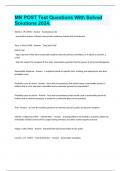
-
MN POST Test Questions With Solved Solutions 2024.
- Exam (elaborations) • 32 pages • 2024
- Available in package deal
-
- $7.99
- + learn more
Weeks v. US (1914) - Answer Exclusionary rule - warrantless seizure of items from private residence violates 4th Amendment Terry v. Ohio (1968) - Answer "Stop and Frisk" police may: - stop a person if they have reasonable suspicion that the person committed, or is about to commit, a crime - frisk the suspect for weapons if they have reasonable suspicion that the person is armed and dangerous Reasonable Suspicion - Answer a suspicion based on specific facts, training, and experi...
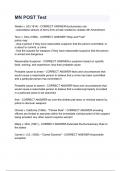
-
MN POST Test Questions With correct& verified Answers
- Exam (elaborations) • 30 pages • 2024
- Available in package deal
-
- $7.99
- + learn more
MN POST Test Weeks v. US (1914) - CORRECT ANSWER-Exclusionary rule - warrantless seizure of items from private residence violates 4th Amendment Terry v. Ohio (1968) - CORRECT ANSWER-"Stop and Frisk" police may: - stop a person if they have reasonable suspicion that the person committed, or is about to commit, a crime - frisk the suspect for weapons if they have reasonable suspicion that the person is armed and dangerous Reasonable Suspicion - CORRECT ANSWER-a suspicion based on specif...
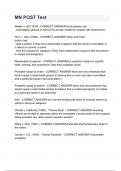
-
MN POST Test Questions With 100% Correct Answers} (2024 / 2025)(Verified by Expert)
- Exam (elaborations) • 30 pages • 2024
- Available in package deal
-
- $7.99
- + learn more
Weeks v. US (1914) - CORRECT ANSWER-Exclusionary rule - warrantless seizure of items from private residence violates 4th Amendment Terry v. Ohio (1968) - CORRECT ANSWER-"Stop and Frisk" police may: - stop a person if they have reasonable suspicion that the person committed, or is about to commit, a crime - frisk the suspect for weapons if they have reasonable suspicion that the person is armed and dangerous Reasonable Suspicion - CORRECT ANSWER-a suspicion based on specific facts, tra...
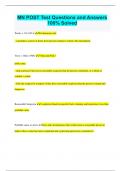
-
MN POST Test Questions and Answers 100% Solved
- Exam (elaborations) • 54 pages • 2024
- Available in package deal
-
- $11.99
- + learn more
100% Solved Weeks v. US (1914) Exclusionary rule - warrantless seizure of items from private residence violates 4th Amendment Terry v. Ohio (1968) "Stop and Frisk" police may: - stop a person if they have reasonable suspicion that the person committed, or is about to commit, a crime - frisk the suspect for weapons if they have reasonable suspicion that the person is armed and dangerous Reasonable Suspicion a suspicion based on specific facts, training, and experience; less than ...
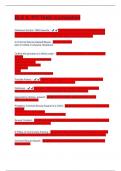
-
BLE IL PTI Tests Cumulative Questions And Answers Rated A+ New Update Assured Satisfaction
- Exam (elaborations) • 19 pages • 2024
- Available in package deal
-
- $9.69
- + learn more
Defenses Section 1983 lawsuits - ️️civil lawsuits authorized by a federal statute against state and local officials and local agencies when citizens have evidence that these officials or agencies have violated their federal constitutional rights to Criminal Sexual Assault/Abuse - ️️consensual lack of verbal or physical resistance Outline the process of a felony case. - ️️Statute of Limitations= 3 years for most felonies Charged via an info. or indictment Preliminary hearing ...
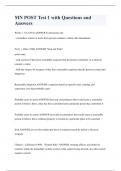
-
MN POST Test 1 with Questions and Answers
- Exam (elaborations) • 37 pages • 2024
-
- $7.99
- + learn more
MN POST Test 1 with Questions and Answers Weeks v. US (1914) ANSWER Exclusionary rule - warrantless seizure of items from private residence violates 4th Amendment Terry v. Ohio (1968) ANSWER "Stop and Frisk" police may: - stop a person if they have reasonable suspicion that the person committed, or is about to commit, a crime - frisk the suspect for weapons if they have reasonable suspicion that the person is armed and dangerous Reasonable Suspicion ANSWER a suspicion based on spe...
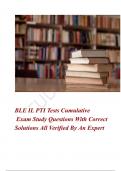
-
BLE IL PTI Tests Cumulative Exam Study Questions With Correct Solutions All Verified By An Expert
- Exam (elaborations) • 19 pages • 2024
-
- $13.99
- + learn more
3 Pillars of Community Policing - ANS Developing Community Partnerships, engaging in problem solving using SARA, Implementing organizational features/transformation. Define the components of the SARA Model. - ANS Scanning- identify and prioritize problems and develop goals. Analysis- identify and understand the events that precede and accompany the problem. Response- Brainstorm for new interventions, outline a response plan, carry out planned activities. Assessment- determine whether ...
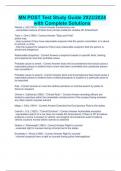
-
MN POST Test Study Guide 2023/2024 with Complete Solutions
- Exam (elaborations) • 23 pages • 2023
- Available in package deal
-
- $12.99
- + learn more
Weeks v. US (1914) - Correct Answer Exclusionary rule - warrantless seizure of items from private residence violates 4th Amendment Terry v. Ohio (1968) - Correct Answer "Stop and Frisk" police may: - stop a person if they have reasonable suspicion that the person committed, or is about to commit, a crime - frisk the suspect for weapons if they have reasonable suspicion that the person is armed and dangerous Reasonable Suspicion - Correct Answer a suspicion based on specific facts, tr...
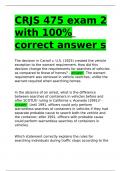
-
The decisACRJS 475 exam 2 with 100- correct answers.ion in Carroll v. U.S. (1925) created the vehicle exception to the warrant requirement. How did this decision change the requirements for searches of vehicles as compared to those of homes? The warrant r
- Exam (elaborations) • 24 pages • 2024
-
- $14.49
- + learn more
The decision in Carroll v. U.S. (1925) created the vehicle exception to the warrant requirement. How did this decision change the requirements for searches of vehicles as compared to those of homes? The warrant requirement was removed in vehicle searches, unlike the warrant required when searching homes. In the absence of an arrest, what is the difference between searches of containers in vehicles before and after SCOTUS' ruling in California v. Acevedo (1991)? Until 1991, officers cou...
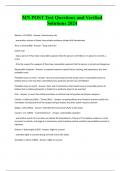
-
MN POST Test Questions and Verified Solutions 2024
- Exam (elaborations) • 27 pages • 2024
- Available in package deal
-
- $11.99
- + learn more
MN POST Test Questions and Verified Solutions 2024 Weeks v. US (1914) - Answer -Exclusionary rule - warrantless seizure of items from private residence violates 4th Amendment Terry v. Ohio (1968) - Answer -"Stop and Frisk" police may: - stop a person if they have reasonable suspicion that the person committed, or is about to commit, a crime - frisk the suspect for weapons if they have reasonable suspicion that the person is armed and dangerous Reasonable Suspicion - Answer -a suspicio...

That summary you just bought made someone very happy. Also get paid weekly? Sell your study resources on Stuvia! Discover all about earning on Stuvia


